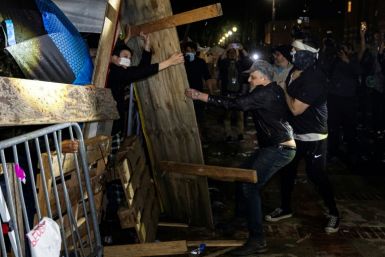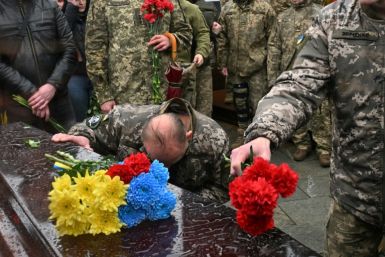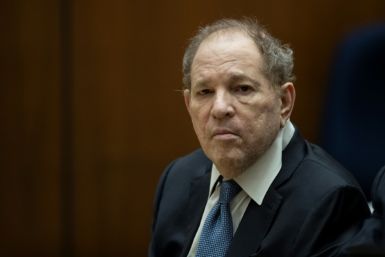Typhoon Haiyan (Yolanda) Update: WHO Warns Mass Burial of Storm Victims Violate Human Rights; Phil Gov’t Finally Admits Shortcomings Amid Growing Anger at President Aquino
The embattled Philippine government is in a no-win situation in the aftermath of super typhoon Haiyan (Yolanda). It's a damn if you do, damn if you don't scenario as it attempts to cope with the gargantuan task of providing for the basic needs of millions of Filipinos rendered homeless by the Category 5 Hurricane-equivalent storm.
One such quandary is the rising number of deaths, now at 2,357, requiring mass burial of decomposing and unrecognisable corpses.
On Thursday, the first mass burial was held in Tacloban City where the bodies were buried in a 2-metre deep grave the size of an Olympic pool.
YouTube/TheGuardian
However, on the same day, the World Health Organisation (WHO) warned the Philippine Department of Health that mass burials without proper identification could violate human rights. WHO cited its Management of Dead Bodies in Disaster Situations manual which states, "Burial of bodies in common graves or the use of mass cremation is unnecessary and a violation of the human rights of the surviving family members."
Besides breaching human rights, the practice could also violate religious and cultural beliefs, particularly among indigenous communities that still observe ancestral rites in burying their dead.
WHO emphasised that the threat of infection from exposed dead bodies is limited, contrary to popular belief.
However, the government is also under pressure from residents who complain of the foul odour coming from the corpses. GMA News reported that some communities in Palo, Leyte, placed messages and signs asking for authorities to remove the bodies out of fear it would cause outbreak of diseases.
Palo also held a mass burial of about 150 corpses.
For the Tacloban mass burial, to help identify the corpses, the National Bureau of Investigation removed a part of the femur from each body. Technicians then will extract DNA from each bit of bone, said Joseph David, the crime photographer of the agency.
It is not just a few thousand dead bodies that the Aquino-led government has to deal with. The bigger problem is the millions who are starving, sick, homeless and very angry at the administration for the very slow flow of relief to the typhoon victims.
On Thursday, Malacanang finally admitted its shortcoming in dealing with the situation. In a press conference, Presidential Communications Operations Office head Herminio Coloma Jr said, quoted by Pep.ph, "If there are negative comments, we accept their comments. We don't deny that there are possible shortcomings from our end."
But he stressed those are the results of severe constraints in terms on manpower, funds, time and transport facilities.
"We did not purposely ignore these things," he added, but also said that there are some things beyond the government's control.
Observers warned that as the post-typhoon days pass and more Filipinos get frustrated by not receiving any assistance would only translate into more anger at Philippine President Benigno Aquino. Otherwise, his six-year term would likely be defined by his administration's apparent failure to help Yolanda's victims.
YouTube/Latest Headlines From Around The World
But again, government's hands are tied since roads made impassable by fallen trees and other debris hamper delivery and distribution, further worsened by lack of large trucks and insufficient access to fuel, particularly in the typhoon-hit areas.
The situation is best described by the controversy generated by CNN reporter Anderson Cooper who noted not seeing any government delivery trucks bearing relief goods. The comment irked DZMM radio talk show host and ABS-CBN newsreader Korina Sanchez who read a blind item about a blonde CNN reporter who does not know what he is talking about.
Read: Storm Haiyan (Yolanda) Update: Blind Item by Filipina Newsreader vs CNN Reporter Goes Viral
Typhoon Haiyan (Yolanda) Update: Filipina Newsreader Skips Morning Radio Show After Flak Over CNN Reporter Blind Item; Flies to Ormoc to Probe Relief Efforts
Typhoon Haiyan (Yolanda) Update: Anderson Cooper & Korina Sanchez Mum About Controversy, But Not Social Media Users
The result was a social media upheaval with netizens chiding Ms Sanchez for criticism Mr Coopers while she is speaking from the safety of her home studio. Following the flak she got on Wednesday, Ms Sanchez, the wife of Interior Secretary Mar Roxas, did not show up at her radio programme nor react to the flak but flew to Ormoc to do field work.
Reports said that she will also go to Tacloban on Friday. Hopefully, she and Mr Cooper would not cross paths or it might create another intertropical convergence zone in social media.
Despite those media war, as more people become frustrated by the bureaucracy, regular media and social media become the court of last instance for long-suffering Filipinos frustrated by a government percept to be slow an inept.






